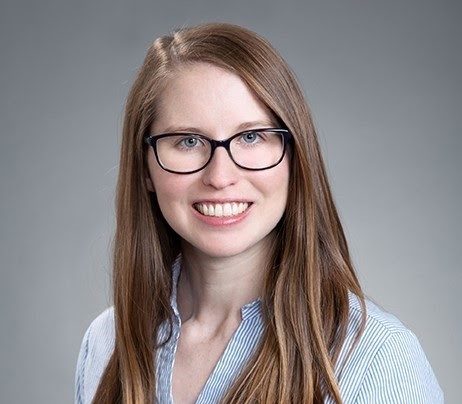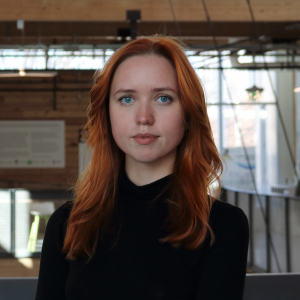How did you end up in cellular agriculture?
I have a surprisingly roundabout story given where I started. I’ve been in tissue engineering for biomedical purposes – mainly cardiac muscle – for over 7 years now. About halfway through my PhD, I started doing some soul searching and realized that I wanted to make a wider impact with my work. I started realizing that the really high-tech medical therapeutics I was working on were probably going to go to the wealthiest of the world. I’ve always been very interested in sustainability and become more alarmed about climate justice, so I actually started incredibly broad – just “I want to work in climate change.”
And climate change led you to food?
Eventually I narrowed it down to “I want to work in sustainable food”. Ultimately, I looked around and realized I was in the BME department at Tufts with David Kaplan and the group in his lab doing research in cellular agriculture, and I realized that was the perfect thing for me to do with my skills.
What other things were you exploring when you were doing that soul searching?
When you go out into the world and say “I want to help the environment and climate change,” it first brings you to energy; that’s just kind of the initial stop. There’s a big community of clean energy people in the Boston area, so I joined some of that and did a lot of research, but I had trouble getting myself passionate about energy. I completely agree it’s really important – I’m buying an electric car soon – but I just didn’t have a personal connection to it.
How exactly did you jump from energy to food, anyway?
I actually can’t remember the specific trigger that brought me to food, but in my climate change research I kept coming across the environmental impacts of food production and it fascinated me. I started attending events like the Northeast Healthy Soil Network Symposium and did a class project on sustainable farming techniques. I became really interested because food touches all of the things I’m passionate about: it impacts climate and the environment, as well as public health and food insecurity around the world.
What’s more appealing to you, the environmental side or the health and food side?
I’d have to say the environmental side is what really gets me up in the mornings, but I see cellular agriculture as a way to help the entire community. I like the approach that the disruption cellular agriculture will bring isn’t going to necessarily wipe out animal agriculture completely, but it’s going to wipe out the extremely detrimental factory farming that has evolved. It will allow for the entire ecosystem of animal products to become more sustainable and healthy.
How did you find New Harvest specifically? Were you involved with any cell ag organizations before?
It was totally the Kaplan lab! I have Natalie Rubio to thank for my entire career trajectory. She started her PhD a year after I did, and before that I’d never heard of cultured meat. It was on my radar starting at that point, and once I figured out that this was the direction I wanted to go in, I had a conversation with Natalie and Andrew about “What is this field? Where can I potentially go?” They were incredibly helpful, so I have them to thank.
What drew you into the research side as opposed to the industry side?
I actually dabbled a little bit in the industry side, working for Counterfactual Ventures for a short period. It was a great experience and I think the cellular agriculture industry is incredibly important – products aren’t going to make it to customers without it! However, I think that open source research is also important to accelerate bringing new technology to reality.
Would you ever want to do that research yourself?
I have figured out that I don’t want to be doing the actual pipetting myself – I think I’m ready to get out of the lab for a little while! Instead I want to be a bridge between academic research and its implementation in industry, as well as the policy that’s going to regulate it. I really want to be that central point using my experience and knowledge to help translate between all of those different stakeholders, and I felt like working at New Harvest in the nonprofit space was really the best way to do that.
You’ve got the research and the industry sides, have you done any policy work before?
I haven’t, no, and when I started that soul search, I realized that policy is something I’m really interested in but have zero skills in. I’m really excited to work with Yadira and learn about that side because it is so important for implementing the changes we need to see.
Looking forward, what are your goals for where you see yourself helping progress New Harvest in the next couple of years?
I think this is such an exciting time to be joining New Harvest because we’re really expanding our vision and reach. Looking at New Harvest’s strategic plan for the next 5 years is so incredibly exciting. I’m thrilled to be a part of the research team to establish what our goals are and develop a plan for meeting those goals. I hope to use my technical background to make sure that the research our fellows are doing align with our strategic goals and fill white spaces in the cell ag field.
One last fun question – if you could pick, right now, any cultured product to try, what would it be and why?
I’ve never been a huge meat eater. My parents joke that as a kid I tried to be vegetarian, but was really just a “dessert-etarian.” I just never loved meat – however, I have a weak spot for dairy. Dairy has been the hardest thing for me to cut out as I’ve moved closer to a vegan diet, so I’m incredibly excited to try cell-cultured milk. Oftentimes when I grab my oat milk out of the fridge, I find myself thinking fondly about when I’ll be able to grab true milk that doesn’t make me feel bad.



